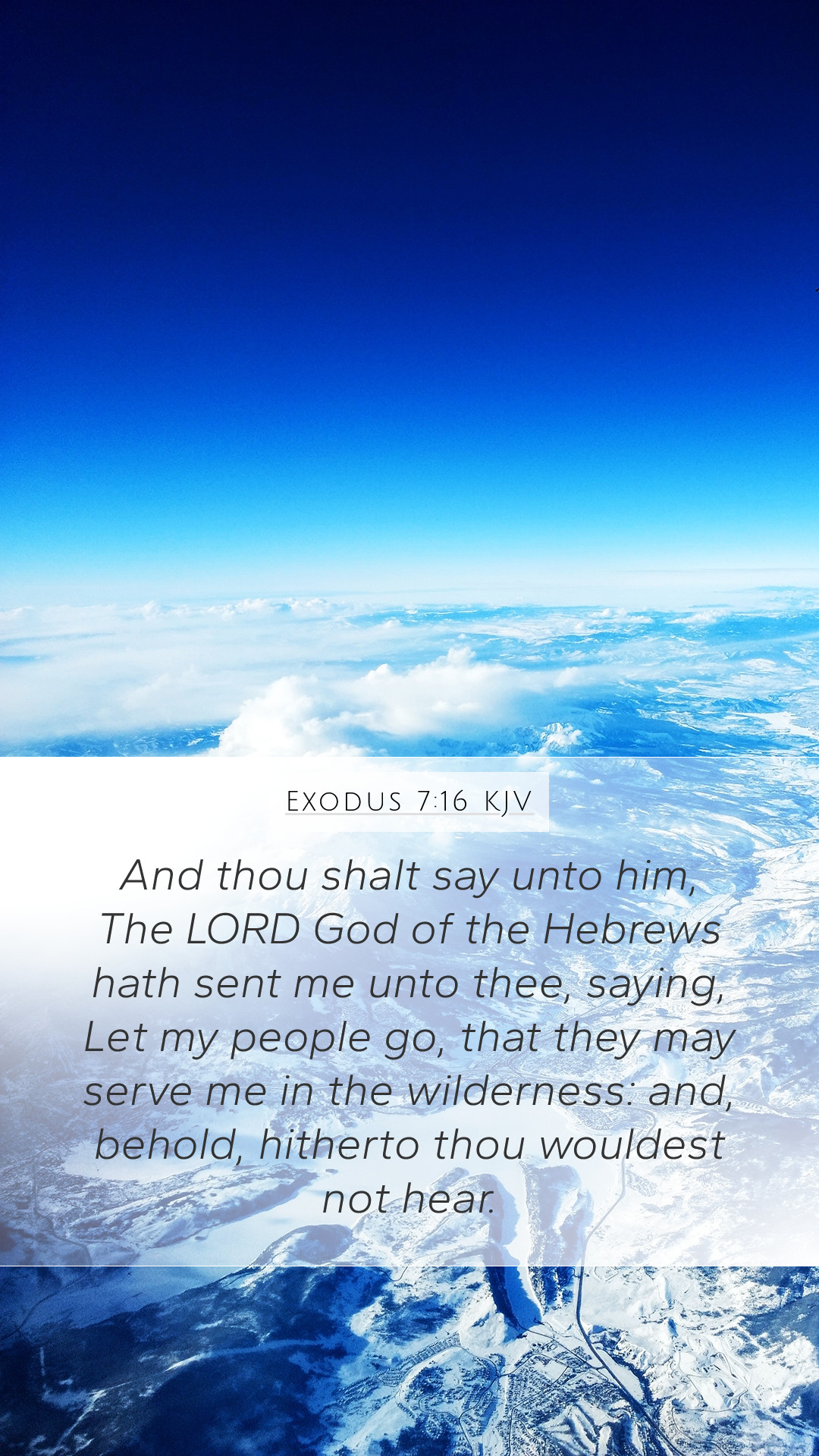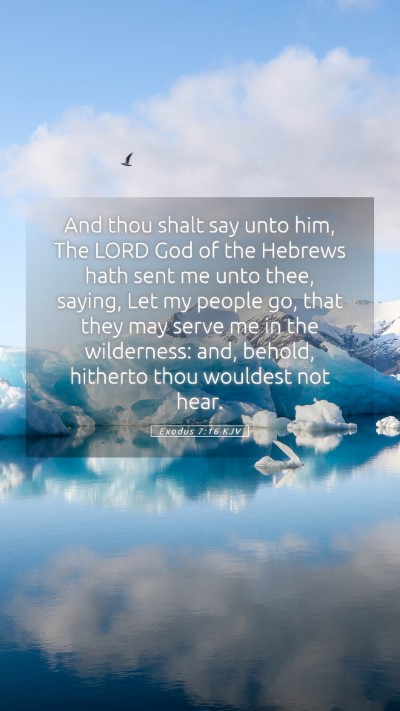Understanding Exodus 7:16
Bible Verse: Exodus 7:16 - "And thou shalt say unto him, The LORD God of the Hebrews hath sent me unto thee, saying, Let my people go, that they may serve me in the wilderness: and, behold, hitherto thou wouldest not hear."
Overview
This verse marks a pivotal moment in the narrative of Moses confronting Pharaoh. It reveals God's command for Pharaoh to release the Israelites from bondage in Egypt. The insistence of God’s intention for the Israelites to serve Him is significant in understanding the purpose of their liberation.
Bible Verse Meanings and Interpretations
The components of this verse have deep theological significance and can be understood through various public domain commentaries.
Divine Authority and Prophetic Voice
Matthew Henry emphasizes the authority of God in this directive. By stating "The LORD God of the Hebrews," it affirms God's sovereign position and the distinction of His people. This recognition serves as a reminder that God speaks through chosen instruments—Moses in this instance—who conveys His message with divine authority.
The Purpose of Deliverance
Albert Barnes highlights that the core message of letting His people go centers not just on freedom but on their purpose: to serve God in the wilderness. This indicates that liberation from slavery is intrinsically tied to the calling of the Israelites as God's chosen people. The verse suggests that serving God is paramount, and freedom is a means to fulfill that service.
Pharaoh’s Rejection of Divine Commands
Adam Clarke notes the obstinacy of Pharaoh as indicated in the latter part of the verse. The phrase "behold, hitherto thou wouldest not hear" underscores the willful ignorance and defiance that Pharaoh exhibits towards God’s command. This observation calls attention to themes of spiritual blindness and resistance to God's will, which are recurrent throughout biblical discourse.
Significance of the Context
Understanding Exodus 7:16 requires a grasp of the historical context of the Exodus narrative. The Israelites were enslaved for generations, and their liberation was not merely about physical freedom but involved spiritual renewal and a covenant relationship with God.
Key Themes in Exodus 7:16
- Authority of God: Recognizing God as the ultimate authority over His people.
- Purpose of Freedom: Emphasizing that freedom is for the purpose of serving God.
- Rejection of God's Word: Highlighting the spiritual obstinacy of Pharaoh.
Applying Exodus 7:16 to Daily Life
Believers today can draw lessons from Exodus 7:16 regarding obedience to God and the significance of divine authority in their lives. The call to serve and the recognition of God's commands remain relevant, inviting reflection on how individuals might be resistant to what God desires for them.
Cross References
Exodus 7:16 can be connected to several other scriptures that hold similar themes:
- Exodus 5:1: "And afterward Moses and Aaron went in, and told Pharaoh, Thus saith the LORD God of Israel, Let my people go, that they may hold a feast unto me in the wilderness."
- Romans 6:22: "But now being made free from sin, and become servants to God, ye have your fruit unto holiness, and the end everlasting life."
- Isaiah 46:11: "Calling a ravenous bird from the east, the man that executeth my counsel from a far country: yea, I have spoken it, I will also bring it to pass; I have purposed it, I will also do it."
Conclusion
The exploration of Exodus 7:16 unveils rich theological insights regarding God's authority, the purpose of His commands, and the concept of serving Him from a place of freedom. This verse encapsulates critical elements of the biblical narrative and invites readers to explore its meaning deeply.
For those engaged in Bible study groups or seeking online Bible study, understanding passages like Exodus 7:16 contributes to a fuller grasp of Scripture. Utilizing Bible study tools and Bible study guides can enhance one's Bible verse commentary and provide deeper Bible study insights.
Whether exploring historical context of Bible verses or looking into the significance of Jesus' teachings, every individual is encouraged to seek understanding and apply the truths found in Scripture to their lives.


